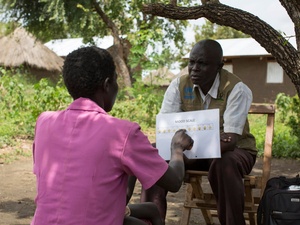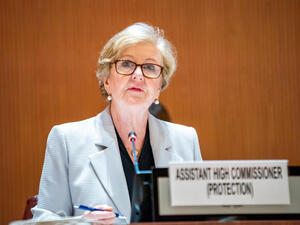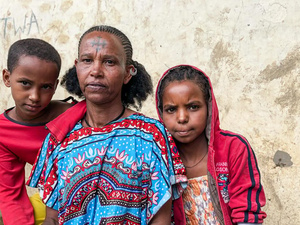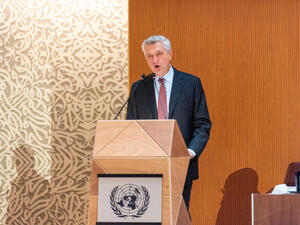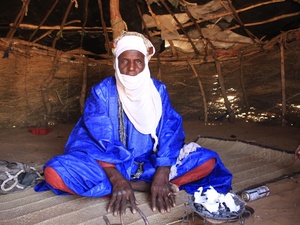Guterres: Complex global population movements demand new strategies
Guterres: Complex global population movements demand new strategies
Monday, 1 October 2007
GENEVA - With millions of people on the move worldwide, UN High Commissioner for Refugees António Guterres called Monday for a concerted international effort to better understand and deal with the causes, scale and complexity of global displacement and migration.
"The present century is a time of human displacement," Guterres told the opening session of UNHCR's 72-nation Executive Committee, the refugee agency's governing body. "With each economic opportunity and departing vessel, with every calamity and conflict, the 21st century is being marked by people on the move."
While emphasising that UNHCR is not a migration management agency, Guterres noted that his office's effectiveness in protecting the world's refugees depends on its ability to better understand the broader patterns of human movement in today's world.
He cited several reasons for the dramatic growth in migration, including poverty and the pursuit of a better standard of living. Eager to join the global economy but unable to move legally, thousands of desperate migrants are resorting to smugglers and other dangerous channels. To fulfil UNHCR's mandate to protect refugees and others in need of protection within these huge movements, "we must recognise the mixed nature of many present-day population flows," Guterres told delegates attending the five-day session.
"In the Mediterranean, the Gulf of Aden and the Caribbean, along north-south frontiers and, increasingly, along south-south borders, in the midst of migrants in search of a better life there are people in need of protection - refugees and asylum seekers, women and children victims of trafficking," he said. "The ability to detect them, assure them of physical access to asylum procedures and a fair consideration of their claims, is a key element of our mission."
The total number of people cared for by UNHCR at the end of 2006 was 32.9 million, including nearly 10 million refugees who have crossed international borders, 13 million people displaced internally within their own countries, and 5.8 million stateless people. After several years of decline, the number of refugees fleeing conflict and persecution rose last year and continues to climb in 2007 with crises such as Iraq and the Horn of Africa adding daily to the ranks of the displaced.
With forced displacement taking place against a wider backdrop of extreme economic deprivation, environmental degradation and climate change, the triggers of human flight are becoming increasingly interrelated and demand targeted strategies and innovative answers.
"Many people move simply to avoid dying of hunger," Guterres noted. "When leaving is not an option but a necessity, this is more than poverty. On the other hand, natural disasters occur more frequently and are of greater magnitude and devastating impact. Almost every model of the long-term effects of climate change predicts a continued expansion of desertification, to the point of destroying livelihood prospects in many parts of the globe. And for each centimetre the sea level rises, there will be one million more displaced. The international community seems no more adept at dealing with these new causes than it is at preventing conflict and persecution."
This was why it was extremely important to examine the reasons, scale and trends of present-day displacement, Guterres said. "It involves much more than understanding refugee flight."
"In Darfur, for example, a Janjaweed attack on an African tribe's village may be motivated by the political crisis," he said. "But the results resemble that of another emerging pattern - a water shortage which sets herders against farmers. On my recent trip to Southern Africa there was a common understanding with governments that Zimbabweans seeking asylum based on persecution should be granted refugee status. But what to do with people who simply say they are hungry and cannot find the means to support their families? Can we knowingly send them back to such deprivation? It is obvious that some form of temporary shelter must be found. The answer to this complex dilemma clearly goes beyond (UNHCR's) own mandate. But it is also our duty to alert states to these problems and help find answers to the new challenges they represent."
Guterres also noted that the more than 4 million uprooted Iraqis in and outside their country constitute the biggest single group of displaced people and largest ever population of 'urban refugees.' Of the more than 2 million outside Iraq, most are in cities in Jordan and Syria. This has placed an enormous burden on the two countries and ranks them among other developing nations that have generously hosted large numbers of refugees, including Pakistan, Iran, Tanzania, Kenya, Chad, Guinea, Zambia and Ecuador.
In addition to supporting refugee programmes in host countries, Guterres said more international burden sharing was needed through third country resettlement. Globally, UNHCR submitted over 54,000 individuals of 70 nationalities for consideration by 26 resettlement countries in 2006 and was set to increase that amount this year. Through June, it had already made over 42,000 resettlement submissions.
"Our biggest resettlement operation right now is Iraq, where UNHCR quickly developed the capacity to identify and submit vulnerable cases," he said. "Resettlement countries have responded, but more efforts should be deployed to speed interviews and the departures of cases."
Voluntary repatriation remained a major solution in 2006, with some 734,000 refugees going home to rebuild their lives. Another 1.9 million internally displaced went home as well.
The High Commissioner also provided an overview of UNHCR's ongoing internal reforms, including the out-posting of more than 120 posts from Geneva and other decentralisation and regionalisation efforts aimed at strengthening the agency's field capacity.
Also joining Guterres on the podium was UN Emergency Relief Co-ordinator John Holmes. Later Monday, Guterres was scheduled to present the 2007 Nansen Refugee Award to Ms. Katrine Camilleri, a Jesuit Refugee Service lawyer who has spent the past decade working with refugee arrivals in Malta.


